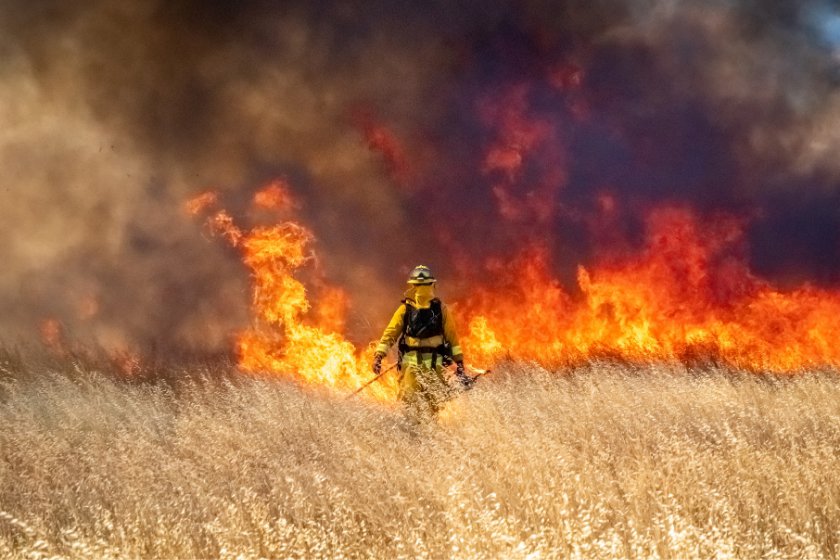Incarcerated firefighters are worthy of our trust–both now and when they're released.

I remember as a young boy seeing wildfires from the windows of my family's home. I watched the smoke rise from the Angeles Crest Mountains across the San Fernando Valley. One fire came up over Mulholland Drive and made it all the way to the hills behind our house. My dad and brother slung hoses over their shoulders and climbed up on the roof, prepared to fight the blaze.
Fortunately, nothing happened that day. But as many of us know, the odds of California families being affected by a wildfire have increased. The fire season used to last from September to November. These days, the fires start earlier and last longer. We are in the midst of some of the largest fires ever to break out in our state. We need more firefighters to fight the increasing number of flames. For many years now, we have looked to our incarcerated men and women to meet this need.
INCARCERATED FIREFIGHTERS RISK THEIR LIVES FOR US
According to California's Department of Corrections and Rehabilitation, 2,600 people in prison are qualified to fight our state's wildfires. I now serve as the president and CEO of Prison Fellowship, the nation's largest Christian nonprofit serving prisoners, former prisoners, and their families, and a leading advocate for criminal justice reform. Our greatest concentration of ministry is in my home state of California, where I got my start volunteering to mentor men on death row inside San Quentin.
I am privileged to have met some of the incarcerated men and women who serve on our state’s fire crews. These are people who go through and graduate from our programs in prison. These hardworking firefighters have completed the same training as California’s other seasonal firefighters. And just like their nonincarcerated counterparts, incarcerated firefighters risk their lives to save ours.
What do they get in return? They are paid $2 to $5 a day, plus $1 per hour when actively fighting a fire. These wages are higher than those received by incarcerated men and women in other fields, but they are meager when considering that nonincarcerated firefighters make an average of $91,000 a year.
PEOPLE WITH A PAST CAN BUILD A MEANINGFUL FUTURE
In addition to paltry wages, many formerly incarcerated firefighters in California have been barred from putting their skills to use in a meaningful way. Those who are on parole or probation, have committed a felony of any kind within the last 10 years, or have more than two felony convictions have long been denied the EMT certification that’s required to join a fire crew in California. A new bill signed by Gov. Newsom on Friday is a meaningful step toward providing a second chance to our incarcerated firefighters when they are released. But lawmakers should do more to reform the occupational licensing rules that keep too many returning neighbors from contributing to their communities by putting their training to good use.
Think about it: These are people entrusted to leave prison, receive training, go fight fires, and afterward return to prison. We trust them to defend our property, our homes, even our lives. Now, let's trust them to do that faithfully after they've paid their debt to society and are living on the outside.
When vetting people in prison to be firefighters, we should always consider their behavior and determine their trustworthiness. Expanding expungement opportunities, as the new law provides, is helpful. But the state should also consider occupational licensing reforms that enable more people with a past to build meaningful careers.
FIGHT FOR SECOND CHANCES AND REFORM
I know firsthand that men and women in prison can be rehabilitated, even radically transformed. Every day I see and hear stories of people in prison who are replacing their negative worldview with a positive, healthy one. Part of that healthy worldview is the understanding that every person has inherent dignity and value and is capable of change.
Incarcerated firefighters are fighting fires for us right now. Let's fight for them to land a job when they get out doing what they already know how to do. Let's fight to give them a second chance.
TOGETHER WE CAN ADVANCE JUSTICE THAT RESTORES
With more than 40 years of experience helping to restore men and women behind bars, Prison Fellowship is a leading national voice shaping the public debate on justice. We mobilize Christians and equip policymakers to advocate for federal and state justice reforms that advance proportional punishment, constructive corrections culture, and second chances.
DID YOU ENJOY THIS ARTICLE?
Make sure you don' t miss out on any of our helpful articles and incredible transformation stories! Sign up to receive our weekly newsletter, and you' ll get great content delivered directly to your inbox.
Your privacy is safe with us. We will never sell, trade, or share your personal information.